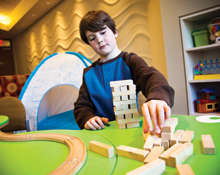Campus News
March 15, 2010
Child study is name of the game

The Emory Child Study Center wants to meet area families with children to explore how our minds develop.
Some of the most valuable minds in research are only a few months old. They belong to the infants who participate in groundbreaking work at the psychology department’s Child Study Center.
How do children learn? What and how do they think and remember? How do children change as they grow older? Families from both within the Emory community and throughout metro Atlanta are helping scientists at the Child Study Center explore these questions and many more.
“The faculty members doing research at the center are national leaders in their respective areas of child development,” says Ayzit Doydum, a lab manager at the center, who assists psychologist Patricia Bauer in her memory development studies.
In one study, a child may don what looks like a stretchy shower cap studded with electrodes, then sit down to watch a puppet show while an electroencephalogram (EEG) allows researchers to peer into her brain. In an adjoining lab, researchers may be tracking the eye movements of an infant while he watches cartoons. Many of the studies are game-like, such as asking children to perform a sequence of actions with toys.
All of the studies are safe. “The biggest risk is that a child might get bored,” Doydum says, “but generally our studies are really fun for the children and their families.”
The center seeks participants ranging in age from newborns through adolescence. The number of children needed for a single study can vary from 30 to 300, says psychologist Laura Namy, whose lab focuses on how children learn language.
Parents are not given feedback on the results for their child, since the data is being studied from a collective perspective.
“This is a volunteer activity, and it’s impressive to me the number of families that are willing to come in and give their time for the greater good of science,” says Child Study Coordinator Kelly Yates.
“I strongly believe in promoting research and the understanding of human development,” says Jill Woodard, a manager of research projects at the Rollins School of Public Health, who recently brought in her 9-month-old son, Bennie, to participate in a study.
“I think it helped me understand my son better and how he interacts with the world,” she adds.
Emory’s psychology department has been a leader in child studies since the 1960s, when an early luminary in the field,
Boyd McCandless, was on the faculty. He later founded Developmental Psychology, the premier child development research journal. The Child Study Center officially opened in 1998, and was spread among several locations. Last May, the center moved into its current home on the ground floor of the new psychology building. Friendly staff welcome families to a bright, comfortable space filled with toys.
“Every parent wonders what’s going on in their child’s brain. Sometimes it can seem like a mystery,” Doydum says. “All the information in parenting books and textbooks wouldn’t be known without research. So we’re really appreciative of the families that come in with their children. We couldn’t do our work without them.”
Quick Links
File Options
Related Information
Support the cause of child research
The Child Study Center seeks families with newborn through school-age and adolescent children for its child development studies. Families interested in participating or learning more can call the Child Study Center at 404-727-7432, or fill out an online form.
